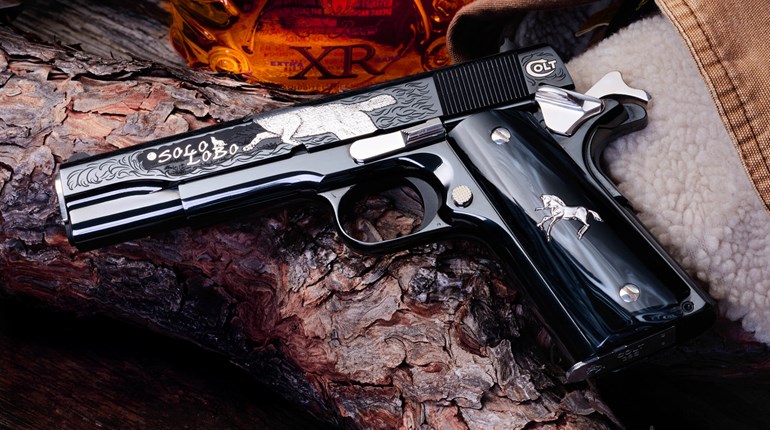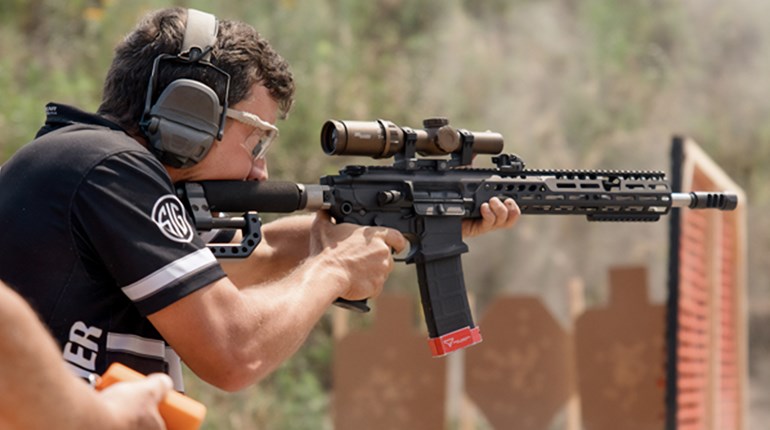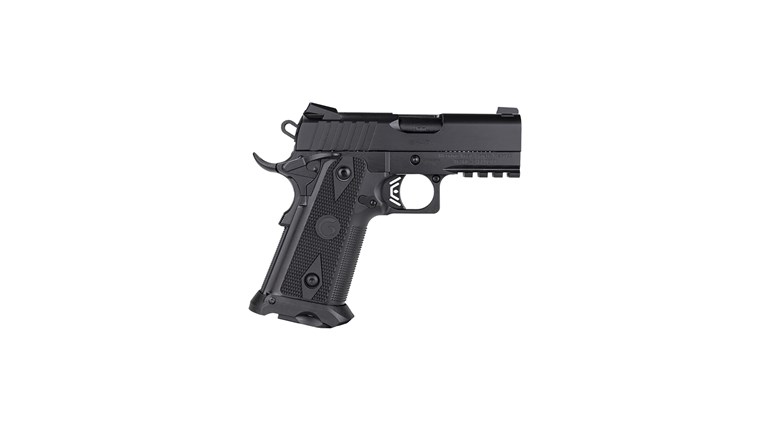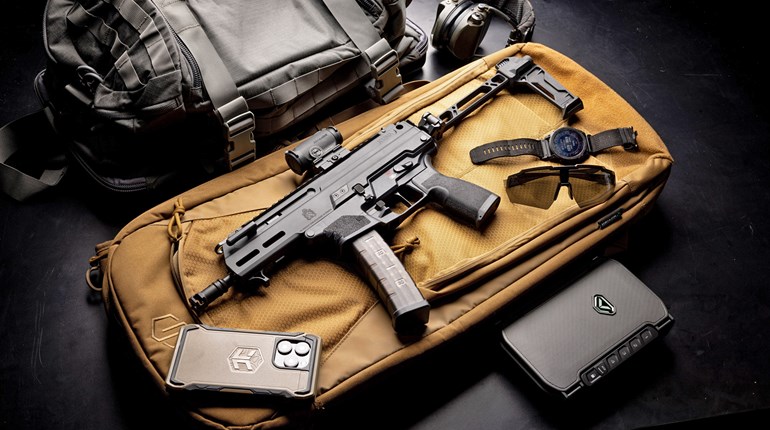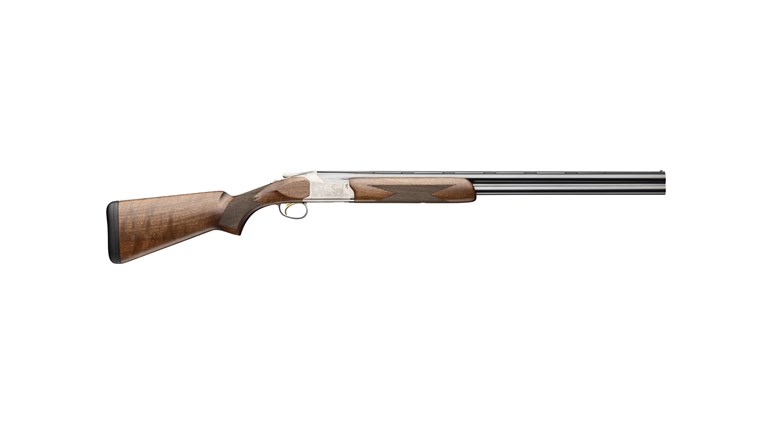
While visiting the SIG Sauer headquarters in Exeter, NH, last year, I had an opportunity to shoot the company's 1911 Tactical Operations, a stylish version of the old warhorse with several custom features. Some shooters may try to compare it to various versions of SIG classics, but the Tactical Operations has the bearing of the Colt 1911, while being manufactured with bank-vault-tough precision.
SIG's 1911 pistols are typified by a slide that is somewhat blunt as compared to the conventional design produced during the past century. The square-shaped slide is a little heavier than normal—a good thing when considering today's +P loads. Is it for that reason SIG 1911 pistols have blunt slides?
It's unlikely. A more reasonable explanation is the visual matching of the SIG 1911 slide to the slide of a classic SIG pistol, like the P220. In any event, the slight addition of slide mass can't hurt—until you try to holster the piece. The Tactical Operations probably won't fit the same rigs as your older 1911s. Of course, holsters are available from several manufacturers that will accommodate the nonstandard slide shape.
Slanted serrations are cut into the Tactical Operations' slide at the rear. There are no front serrations. The extractor is external, and it functioned admirably during testing. I couldn't attribute any stoppages to the extractor.
The sights are from Novak's, and they've been graced with tritium vials in the three-dot pattern. I could complain because I prefer the glowing dot up front and nothing in the rear, but I won't since these are real Novak's sights.
Measuring 5 inches long, the standard-contour barrel mates with the slide via a bushing at the front. The recoil-spring guide is short, and a conventional recoil-spring plug completes the setup.
SIG Sauer added a number of extras when building the Tactical Operations. First, an accessory rail is located on the underside of the frame. Three slots provide plenty of options for mounting a variety of weaponlights and lasers.
The pistol's frontstrap and backstrap are finely checkered. Also helping with purchase are the Ergo XT Grips, which are held on with hex-head screws. The pebbly surface of the stocks lends a positive grip without being abrasive.
To aid in reloading the Tactical Operations, an extended magazine well is bolted to the grip frame. For the same reason, the magazine-release button is larger than that found on a standard 1911; my short thumb finds it quickly when the eight-round magazine is depleted. Speaking of magazines, the Tactical Operations ships with four of them.
A solid trigger with an overtravel adjustment screw and ambidextrous safety levers are fitted to the pistol. The safety lever on the left side is trimmed back, allowing the installation of Crimson Trace Lasergrips. However, there's still plenty of paddle to reach without coming to a sharp point as seen on other cut-off units.
The grip safety is an upward-swept beavertail with a hump at its base. There is also a firing-pin safety; it's pushed out of the way when the trigger is pulled, not when the grip safety is depressed.
I tested the gun on a blustery day when temperatures were in the mid-30s and the wind was gusting to 30 to 35 miles per hour. This turned accuracy testing into a real challenge.
I began by shooting the FBI firearms instructor bullseye course. The first stage was 10 rounds in 10 minutes. The Tactical Operations' trigger was firm but crisp, breaking at slightly more than 5 pounds.
I shot through the slow-fire course in just more than 3.5 minutes. Next came timed fire—two strings of five rounds in 15 seconds each, fired at 15 yards. Finally, the rapid-fire portion consisted of two strings of five rounds in 10 seconds.
It takes a 90-percent score to pass. I dropped 14 points for a score of 286/300. The Tactical Operations, along with a very accurate 200-grain semi-wadcutter load from Black Hills, helped me forget about the cold for a 95-percent score.
Later, I fired various drills and courses of fire, and found a few points of interest. First, the Tactical Operations fed and functioned with short, 185-grain jacketed semi-wadcutter bullets, which can be a curse on many 1911 pistols. The slide velocity was low—I was guessing a bystander could read the slide markings as it moved through recoil.
Conversely, two good and powerful law enforcement and personal-defense loads choked the pistol. The Cor-Bon 185-grain DPX +P had the most trouble. The company's 230-grain JHP +P had fewer problems, but the bullet nose periodically pushed into the feed ramp.
This may indicate a few issues. Perhaps the slide isn't traveling back far enough to allow the cartridge to line up with the feed ramp. That could be a recoil spring, slide mass and/or magazine spring issue. I had four magazines and couldn't nail the problem down to one of them. I didn't change recoil springs, but doubt the slide was failing to fully travel to the rear.
The Winchester Supreme 230-grain SXT fed 100-percent reliably in the Tactical Operations. Shooting an average group size of 2 inches at 25 yards, it was no slouch in the accuracy department, either.
Those feedings problems were the only negative I encountered in testing. The SIG Sauer 1911 Tactical Operations is one of the finer 1911s I've used—particularly at its price point.
Manufacturer: SIG Sauer; (603) 772-2302
Action Type: Recoil-operated, semi-automatic
Caliber: .45 ACP
Capacity: 8+1
Frame: Stainless steel, Nitron finish
Barrel Length: 5 inches
Rifling: 6 grooves; 1:16-inch, LH twist
Trigger Pull Weight: 5 poundsSights: Novak's LoMount Night Sights
Grips: Ergo XT Grips
Length: 8.7 inches
Height: 5.5 inches
Width: 1.4 inches
Weight: 41.6 ounces (with magazine)
Accessories: Four, eight-round magazines
MSRP: $1,213
For more photos of the SIG Sauer 1911 Tactical Operations you can go here.











